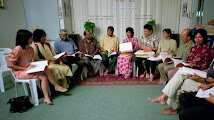CHINA: Spate of Factory Suicides Exposes Sorry Plight of Workers
IPS ipsnews.net
"I can use the word ‘miserable’ to describe working conditions in China," Xiao Qingshan, a labour rights activist whose nephew worked at Foxconn, told IPS. "There’s a strange phenomenon in China where the people who work the hardest earn the least."
At Foxconn, Xiao said, employees are underpaid, forced to work 12 hour days and routinely subjected to verbal abuse from managers. Xiao, who conducted interviews with Foxconn employees and relatives of suicide victims, said employees were also forced pay an "introduction fee" of up to 20,000 renminbi (about 3,000 U.S. dollars) before starting work at the factory...
[Ji Shao, a labour expert at Capital University of Economics and Business in Beijing] said that China’s labour laws are routinely violated and that workers are offered very little protection. Last year during a trip to Dongguan, an industrial city in Guangdong province, Ji and her team found that 80 percent of companies were violating labour laws; many companies refused to sign contracts with workers and were paying a salary below the minimum wage.
Xiao called China’s labour laws 'useless' and said they exist only for show. 'The local governments use them to safeguard and protect local businesses, but no one cares whether the benefits intended for workers are guaranteed,' he said.
Dicta:
The betterment of the world can be accomplished through pure and goodly deeds, through commendable and seemly conduct.
(Bahá'u'lláh, cited in Shoghi Effendi, Advent pp. 24-25)
The fourth principle or teaching of Bahá’u’lláh is the readjustment and equalization of the economic standards of mankind. This deals with the question of human livelihood. It is evident that under present systems and conditions of government the poor are subject to the greatest need and distress while others more fortunate live in luxury and plenty far beyond their actual necessities. This inequality of portion and privilege is one of the deep and vital problems of human society. That there is need of an equalization and apportionment by which all may possess the comforts and privileges of life is evident. The remedy must be legislative readjustment of conditions. The rich too must be merciful to the poor, contributing from willing hearts to their needs without being forced or compelled to do so. The composure of the world will be assured by the establishment of this principle in the religious life of mankind.
('Abdu'l-Bahá, Promulgation 107)





No comments:
Post a Comment